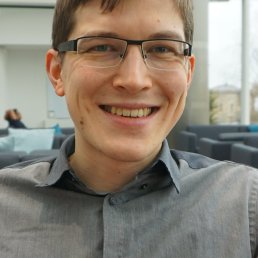
Erik Panzer
Feynman integrals, graph polynomials and zeta values
Where do particle physicists, algebraic geometers and number theorists meet?
Feynman integrals compute how elementary particles interact and they are fundamental for our understanding of collider experiments. At the same time, they provide a rich family of special functions that are defined as period integrals, including special values of certain L functions.
In the talk I will give the definition of Feynman integrals via graph polynomials and discuss some examples that evaluate to values of the Riemann zeta function. Then I will discuss some of the interesting questions in this field and mention some of the techniques that are used to study these.
[[{"fid":"47855","view_mode":"media_square","fields":{"format":"media_square","field_file_image_alt_text[und][0][value]":"Yuji Nakatsukasa","field_file_image_title_text[und][0][value]":"Yuji Nakatsukasa"},"type":"media","attributes":{"alt":"Yuji Nakatsukasa","title":"Yuji Nakatsukasa","height":"258","width":"258","class":"media-element file-media-square"}}]]
Yuji Nakatsukasa
Computing matrix eigenvalues
The numerical linear algebra community solves two main problems: linear systems, and eigenvalue problems. They are both vastly important; it would not be too far-fetched to say that most (continuous) problems in scientific computing eventually boil down to one or both of these.
This talk focuses on eigenvalue problems. I will first describe some of their applications, such as Google's PageRank, PCA, finding zeros and poles of functions, and global optimization. I will then turn to algorithms for computing eigenvalues, namely the classical QR algorithm---which is still the basis for state-of-the-art. I will emphasize that the underlying mathematics is (together with the power method and numerical stability analysis) rational approximation theory.

